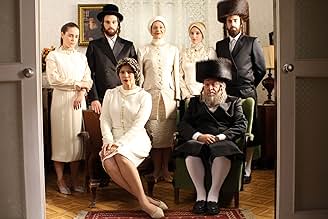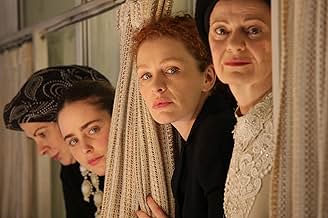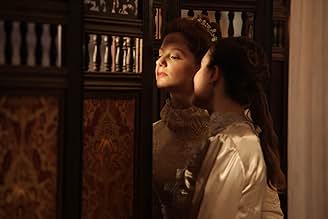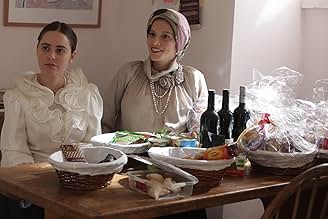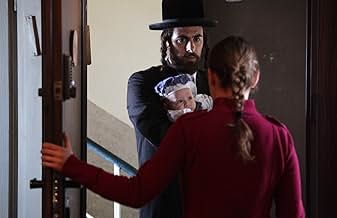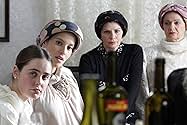IMDb RATING
6.7/10
4.1K
YOUR RATING
When the older sister of Shira, an 18-year-old Hasidic Israeli, dies suddenly in childbirth, Shira must decide if she can and should marry her widowed brother-in-law, which also generates te... Read allWhen the older sister of Shira, an 18-year-old Hasidic Israeli, dies suddenly in childbirth, Shira must decide if she can and should marry her widowed brother-in-law, which also generates tensions within her extended family.When the older sister of Shira, an 18-year-old Hasidic Israeli, dies suddenly in childbirth, Shira must decide if she can and should marry her widowed brother-in-law, which also generates tensions within her extended family.
- Awards
- 14 wins & 16 nominations total
- Director
- Writer
- All cast & crew
- Production, box office & more at IMDbPro
Featured reviews
10clg238
This is a gorgeous film. The cinematography, largely revealing closeups of the characters, is stunning, bringing us close in to an unfamiliar world, an insular, deeply religious culture. The acting is flawless. But what brings me to give this film a top rating is the story, one of moral complexity--life, after all, is complicated, a truism that Hollywood films fail miserably in addressing, the rare times they attempt to do so (perhaps "The Master" and "Doubt" are exceptions). A young, innocent woman desires to make a marriage match that is in accordance with her Jewish Orthodox tradition and yet in some ineffable way is personally to her taste. At first this seems possible, but unforeseen circumstances make her choice of marriage partner difficult. She is not just choosing for herself and potential partner but her choice is central to the happiness or unhappiness of relatives and friends—a situation of which she is acutely aware. How can she make the right choice for everyone, herself included? In a culture seeped in moral values, the moral answer to her dilemma is not an easy one. It has been a long time since I've been so deeply moved by a film.
One reason to view FILL THE VOID, written and directed by Rama Burshtein, is the opportunity to view the clothing, the mannerisms, the singing (endless), and the other unique characteristics of Israel's ultra-Orthodox Hasidic community. For those who have never witness this spectrum of Judaism it is an eye-opening experience: religious law, tradition and the rabbi's word are absolute. Marriages are arranged and a woman's outside options are limited, as marriage is a central and crucial moment in their lives. Matches are arranged, decisions about whom to marry are critically important, but apparently the woman always has the right to turn down a prospective suitor. Of importance to note, Rama Burshtein comes form this community and her understanding of all the permutations is obvious.
Shira (Hadas Yaron), a devout 18-year-old Israeli, has come of age and is considering marriage, having met her first serious suitor Yossi (Ido Samuel). Shira's eldest sister Esther (Renana Raz) suddenly dies in childbirth leaving her grieving husband Yochay (the very handsome and talented Yiftach Klein) with a son and no mother to care for the infant. Despite his grief (and the grief of Shira's parents - Irit Sheleg and Chayim Sharir) Yochay decides he must marry. Shira's other sister Frieda (Hila Feldman) declares that Esther had informed her that should anything happen to Esther, Frieda should marry Yochay. Shira's mother, afraid that Yochay will take the offer from a Belgium woman to marry and thus move away with her grandson from Tel Aviv, encourages Shira to marry Yochay. Shira is conflicted, gains support from her armless unmarried aunt Hanna (Razia Israeli) who knows that in this community a woman MUST be married, and after much discussion among the Rabbi (Melech Thal) and the family and Yochay and Shira, a conversation between the couple seals their fate.
The acting is excellent, the cinematography often times seems flooded with light and slightly out of focus as if taken through layers of wedding veils (!), the costumes are amazing even they are the usual dress mode of this Hassidic community, and the attention to detail of such moments as Purim and Shabbat are immaculate. The seemingly endless amount of singing by the men does grow a bit wearisome and covers dialogue at times, but this is a fresh and fascinating view of love, traditions, and laws and the still viable personal choices in this colorful community. In Hebrew with English subtitles.
Grady Harp
Shira (Hadas Yaron), a devout 18-year-old Israeli, has come of age and is considering marriage, having met her first serious suitor Yossi (Ido Samuel). Shira's eldest sister Esther (Renana Raz) suddenly dies in childbirth leaving her grieving husband Yochay (the very handsome and talented Yiftach Klein) with a son and no mother to care for the infant. Despite his grief (and the grief of Shira's parents - Irit Sheleg and Chayim Sharir) Yochay decides he must marry. Shira's other sister Frieda (Hila Feldman) declares that Esther had informed her that should anything happen to Esther, Frieda should marry Yochay. Shira's mother, afraid that Yochay will take the offer from a Belgium woman to marry and thus move away with her grandson from Tel Aviv, encourages Shira to marry Yochay. Shira is conflicted, gains support from her armless unmarried aunt Hanna (Razia Israeli) who knows that in this community a woman MUST be married, and after much discussion among the Rabbi (Melech Thal) and the family and Yochay and Shira, a conversation between the couple seals their fate.
The acting is excellent, the cinematography often times seems flooded with light and slightly out of focus as if taken through layers of wedding veils (!), the costumes are amazing even they are the usual dress mode of this Hassidic community, and the attention to detail of such moments as Purim and Shabbat are immaculate. The seemingly endless amount of singing by the men does grow a bit wearisome and covers dialogue at times, but this is a fresh and fascinating view of love, traditions, and laws and the still viable personal choices in this colorful community. In Hebrew with English subtitles.
Grady Harp
Set in an orthodox Hasidic Jewish community in Tel Aviv, FILL THE VOID centers around eighteen-year-old Shira's (Haldas Yaron), decision about whether to marry widower Yochay (Yiftach Klein) or not. Yochay was already married to her sister Esther (Renana Raz), but sadly Esther passed away during childbirth. The title sums up the film's principal theme: by following her family's fishes, Shira will fill the void created by Esther's passing, and hence become a good mother to Esther and Yochay's newly-born son Mordecai. Morally speaking, she believes she is doing the right thing by accepting Yochay's offer, but director Rama Burshtein asks us to reflect on whether the decision will fill the void in Shira's life, or simply deepen it. Issues of love never seem to enter Shira's mind; she believes she is obliged to marry, and hence works hard to persuade the rabbi (Melech Thal) to sanction her decision. The film is tightly constructed as a series of close-ups and two-shots: the camera gives us a unique insight into Shira's turbulent state of mind, as she sits opposite Yochay, her head bowed, her lip quivering as she tries her best to maintain a facade of calm. Her family offer her a limited amount of support, but it's clear that they are forcing her into marriage. The only way she can obtain succor is to pray to God: in one sequence she is photographed from above, her eyes staring into the camera, as she tries to listen to His word. The ending is quite achingly poignant; in her wedding dress, Shira looks stunningly beautiful, but she cannot sit still. Her body repeatedly rocks from left to right, almost as if she is trying to lull herself into a trance- like state to cope with her forthcoming ordeal. Burshtein cuts to the wedding ceremony, where her head is covered with a white sheet; she is quite literally blinded to what follows, while the families celebrate. The film ends with the now-married couple alone after the ceremony has concluded. They stand at either end of the room and Shira stares blankly into space, underlining the irony inherent in the film's title. A low-key film, but totally compelling nonetheless.
10Red-125
The Israeli film Lemale et ha'halal was shown in the United States with the title "Fill the Void" (2012). It was written and directed by Rama Burshtein. Other films exist about highly observant Jews, both in Israel and the U.S. However, this movie is unusual because the director herself if part of the orthodox community. She knows how people act, what they say, how they celebrate, and how they mourn.
As in many communities where a woman's outside options are limited, marriage is a central and crucial moment in their lives. Matches are arranged, but the woman always has the right to turn down a prospective suitor. Even so, the decision about whom to marry is critically important.
The wonderful young Israeli actor Hadas Yaron plays Shira, whose time for marriage has come. A match has been made, and Shira is excited about meeting the young man and, presumably, falling in love with him. Then tragedy strikes. Shira's loving older sister dies in childbirth, leaving behind a baby boy and a widower. In order to keep the family together, it is suggested that Shira marry the baby's father. He appears to be a fine man, but he's older than she is. Also, as Shira points out, she had dreams of exploring marriage with a young man, not with a previously-married man who has a child.
It would have been easy for the director to craft a story where the whole community is pushing Shira to marry Yochay, her late sister's widower. That's not how the film was crafted. Everyone respects Shira's right to decide, and Yochay isn't desperate, either. A match has been made for him with a woman from Belgium. (The problem is that he'd have to move to Belgium to be with her, and, of course, he'd take his infant son with him.)
You'll have to see the film to find out what happens next. However, the movie is far more than just a vehicle for a plot. It's an intimate look into the lives of the ultra-orthodox, and into the heart and mind of a young woman who wants to do what is right, but also what is best.
Fill the Void won six Israeli Academy Awards, including Best Actress, Best Director, and Best Film. Hadas Yaron won the Best Actress award at the 2012 Venice Film Festival.
We saw this film at Rochester's Dryden Theatre as part of the exceptional Rochester Jewish Film Festival. I think it will work better on a large screen than on DVD, but it's worth searching for it and seeing it on a small screen if necessary. For reasons I can't understand, this movie has a lukewarm IMDb rating of 6.6. Why? It's a brilliant film and deserves to be seen. Ignore the low rating, and don't miss "Fill the Void."
As in many communities where a woman's outside options are limited, marriage is a central and crucial moment in their lives. Matches are arranged, but the woman always has the right to turn down a prospective suitor. Even so, the decision about whom to marry is critically important.
The wonderful young Israeli actor Hadas Yaron plays Shira, whose time for marriage has come. A match has been made, and Shira is excited about meeting the young man and, presumably, falling in love with him. Then tragedy strikes. Shira's loving older sister dies in childbirth, leaving behind a baby boy and a widower. In order to keep the family together, it is suggested that Shira marry the baby's father. He appears to be a fine man, but he's older than she is. Also, as Shira points out, she had dreams of exploring marriage with a young man, not with a previously-married man who has a child.
It would have been easy for the director to craft a story where the whole community is pushing Shira to marry Yochay, her late sister's widower. That's not how the film was crafted. Everyone respects Shira's right to decide, and Yochay isn't desperate, either. A match has been made for him with a woman from Belgium. (The problem is that he'd have to move to Belgium to be with her, and, of course, he'd take his infant son with him.)
You'll have to see the film to find out what happens next. However, the movie is far more than just a vehicle for a plot. It's an intimate look into the lives of the ultra-orthodox, and into the heart and mind of a young woman who wants to do what is right, but also what is best.
Fill the Void won six Israeli Academy Awards, including Best Actress, Best Director, and Best Film. Hadas Yaron won the Best Actress award at the 2012 Venice Film Festival.
We saw this film at Rochester's Dryden Theatre as part of the exceptional Rochester Jewish Film Festival. I think it will work better on a large screen than on DVD, but it's worth searching for it and seeing it on a small screen if necessary. For reasons I can't understand, this movie has a lukewarm IMDb rating of 6.6. Why? It's a brilliant film and deserves to be seen. Ignore the low rating, and don't miss "Fill the Void."
Gets _way_ further inside the world of the "Orthodox Jew" than anything I've ever even heard about before. The director and some of the actors really are Orthodox, so the portrayals of both home life and ceremonies that are seldom photographed are truly accurate, not just informed guesses. Yet this is not an "ethnographic record", it's a feature film. And the cinematography is excellent, about as far from an "amateur home movie" as you could possibly get.
The glass-half-full description is "a character study" - the glass-half-empty description is "slow boiler". Those prone to getting fidgety will probably be tested beyond their endurance. The psychological nuances aren't trivial - this film is the official submission of Israel to the Best Foreign Language Film for the Academy Awards.
The treatment of women looks "old-fashioned" to us: separate rooms, hair covering, emergency health care workers restricted if they might see something they normally wouldn't ...all the horror stories we've heard. This deeper look though shows us the considerable adaptation and flexibility around those rules-- architecture modified so those separate rooms aren't all that separate, a spinster covering her hair on the advice of her rebbe even though she'd never been married so people wouldn't ask so many awkward questions, the wife controlling the money in a rebbe's household, arranging clandestine peeks at potential mates via cellphone. The clumps of women standing in doorways reminded me powerfully of the clumps of servants in those Manor House period piece films like Gosford Park. The blocking of access to females in physical distress reminds me of stories out of Saudi Arabia. And the photo I saw later of a "fashion designer" Muslim hair covering looked so much like what these Orthodox women wear I did a double-take.
No easy answers, no "good guys" and "bad guys". There are both pros and cons. Downsides include difficulty finding a marriage partner, great difficulty keeping widows and widowers within the community, birth defects apparently from genetic inbreeding, and almost complete loss of input into the direction of the surrounding society/economy. Upsides include very strong support from both family and friends, and unparalleled community closeness. Where else do non-relatives easily call other adults by their pet names when the going gets rough? And how often do family friends feel free to proffer a word of contrary advice at any time? And although someone's decision to move away is often somewhat painful to others, where else would people literally rather die?
Beforehand I was ready to keep my distance and laugh at "those silly people". But watching it I realized the film applies equally well to _all_ communities that are "in the world but not of the world": fundamentalist Christians; even hippies who've resigned themselves to having zero political influence. There's a whole lot of space in the middle on the line with "modern society" on one end and "a cult" on the other end. Although on the surface this film is about a particular world that's about as familiar to me as living on Mars, the deeper story of gaining community but losing interaction with the surrounding society/economy still has me ruminating days later.
The glass-half-full description is "a character study" - the glass-half-empty description is "slow boiler". Those prone to getting fidgety will probably be tested beyond their endurance. The psychological nuances aren't trivial - this film is the official submission of Israel to the Best Foreign Language Film for the Academy Awards.
The treatment of women looks "old-fashioned" to us: separate rooms, hair covering, emergency health care workers restricted if they might see something they normally wouldn't ...all the horror stories we've heard. This deeper look though shows us the considerable adaptation and flexibility around those rules-- architecture modified so those separate rooms aren't all that separate, a spinster covering her hair on the advice of her rebbe even though she'd never been married so people wouldn't ask so many awkward questions, the wife controlling the money in a rebbe's household, arranging clandestine peeks at potential mates via cellphone. The clumps of women standing in doorways reminded me powerfully of the clumps of servants in those Manor House period piece films like Gosford Park. The blocking of access to females in physical distress reminds me of stories out of Saudi Arabia. And the photo I saw later of a "fashion designer" Muslim hair covering looked so much like what these Orthodox women wear I did a double-take.
No easy answers, no "good guys" and "bad guys". There are both pros and cons. Downsides include difficulty finding a marriage partner, great difficulty keeping widows and widowers within the community, birth defects apparently from genetic inbreeding, and almost complete loss of input into the direction of the surrounding society/economy. Upsides include very strong support from both family and friends, and unparalleled community closeness. Where else do non-relatives easily call other adults by their pet names when the going gets rough? And how often do family friends feel free to proffer a word of contrary advice at any time? And although someone's decision to move away is often somewhat painful to others, where else would people literally rather die?
Beforehand I was ready to keep my distance and laugh at "those silly people". But watching it I realized the film applies equally well to _all_ communities that are "in the world but not of the world": fundamentalist Christians; even hippies who've resigned themselves to having zero political influence. There's a whole lot of space in the middle on the line with "modern society" on one end and "a cult" on the other end. Although on the surface this film is about a particular world that's about as familiar to me as living on Mars, the deeper story of gaining community but losing interaction with the surrounding society/economy still has me ruminating days later.
Did you know
- TriviaHadas Yaron had to lie to get out of her military duty to audition for the film.
- ConnectionsFeatured in At the Movies: Venice Film Festival 2012 (2012)
- SoundtracksIm Eshkachech Yerushalayim
(uncredited)
- How long is Fill the Void?Powered by Alexa
Details
Box office
- Gross US & Canada
- $1,775,316
- Opening weekend US & Canada
- $59,164
- May 26, 2013
- Gross worldwide
- $3,197,615
- Runtime
- 1h 30m(90 min)
- Color
- Sound mix
- Aspect ratio
- 2.35 : 1
Contribute to this page
Suggest an edit or add missing content







